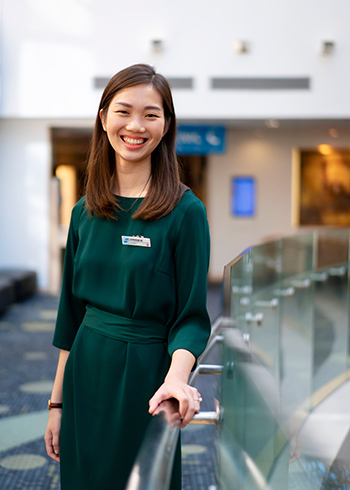As an academic medical centre, Singapore Health Services (SingHealth) brings clinical care, education, and research together to pursue innovations that make healthcare better and more accessible to all patients. Their commitment: “Care to Heal, Educate to Empower, and Innovate to Advance.”
To achieve these goals, SingHealth relentlessly nurtures the next generation of healthcare professionals, encouraging the constant growth of new talent to carry the baton of healthcare in Singapore. We checked in with Catherine Ng, 27, who recounts her own journey as a SingHealth scholar.
What made you decide on the SingHealth Health Science Scholarship (HSS)?
I had enrolled into the Bachelor of Health Sciences and Master of Orthoptics in La Trobe University and embarked on my first year in university before I heard about the Scholarship. A course mate from Singapore was on the Singapore National Eye Centre (SNEC) scholarship and he heard that SingHealth was offering mid-term scholarships at the time. I felt that it would be good exposure to start work in the designated national eye centre when I returned to Singapore, and since SNEC falls under SingHealth, I decided to apply for the scholarship following the encouragement of family and friends.
How has the scholarship helped with both your personal and professional development?
The scholarship helped me grow personally and professionally, especially in the years when I was studying abroad. There were regular Scholarship Engagement Dinners held in Melbourne, where health science and nursing scholars met up and it was great for social networking.

Catherine Ng Lei Yee
Orthoptist
Bachelor of Health Sciences – La Trobe University
Master of Orthoptics – La Trobe University
The scholarship also provided many opportunities for attachments back in Singapore during the holidays, which were eye-opening experiences. What happens in the clinics is usually different from what we had learnt from textbooks or practised in practical sessions at university. These observational attachment sessions helped me gain better insights on the local healthcare system and establish a firm foundation which was built up further during my clinical placements in my senior years of studies.
Share with us your overseas experience.
I was given the opportunity to go to Moorfields Eye Hospital in London for five weeks as part of my final clinical placements, and I had the most rewarding experience in my undergraduate life. At one of the oldest and largest centres for ophthalmic treatment, I learnt a lot whilst being exposed to the British healthcare system and its various programmes and services. Orthoptists in the UK work differently to how we were taught in Australia, and although there was a steep learning curve initially, all the supervisors were helpful and guided me along the way, imparting skills which I currently practise back in Singapore.
How did you decide on the path of an orthoptist?
I have always been fascinated in the field of healthcare, especially about how our eyes work to help us see. When I stumbled upon Orthoptics as an area of allied health services while researching in my second year of Junior College, it felt like this was meant to be.
While waiting for the release of my ‘A’ Level results, I had gone for a two-week observation stint at the eye clinic in Tan Tock Seng Hospital. When I saw the interaction between the orthoptist and patients from all walks of life, as well as how the orthoptist worked with other healthcare professionals, it further affirmed my decision to pursue a career as an orthoptist.
“There are many courses and conferences available for us to attend, for instance, learning a language to communicate more effectively with patients...”Catherine Ng
What initiatives are there in SingHealth that reinforce ‘Educate to Empower’?
There are many courses and conferences available for us to attend, for instance, learning a language to communicate more effectively with patients, or something related to Academic Medicine, where we can pick up and hone our skills, knowledge, and practical skills. The SingHealth Duke-NUS Education Conference is held annually in September and we are encouraged to go for it.
Continuing education is another way SingHealth reinforces Educate to Empower – monthly journal club on various ophthalmological conditions are discussed based on real cases and treatment options are backed up with published journal articles. We then implement these evidence-based practice into our daily clinical situations.
If you have one piece of advice for someone looking to apply for this scholarship, what would it be?
A career in orthoptics can be challenging as it requires an inquisitive mind, patience, and empathy. We see patients from as young as six months old, to as old as 94 years with various ocular misalignment and eye movement disorders. The patient load can be high and stressful situations can arise from frustrated patients, caregivers, and family members. But it is rewarding when you see patients walking out of the room easily as they no longer have double vision, or when children no longer need a patch for lazy eye. If you enjoy social interaction with people from all walks of life, this will be a good fit for you. To get a better idea of what orthoptics entails, try arranging for observation sessions in a real-life setting.
This article was first published in BrightSparks Magazine July 2019. Republished with permission from CareerBuilder Singapore.